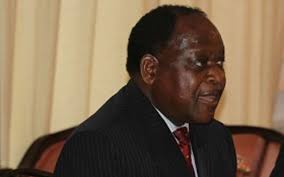By Byron Mutingwende
Contrary to the notion that there is acrimony between the Zimbabwean government and the United Nations country office, the partnership is robust, a senior government official has said.
This emerged at a press briefing on the sidelines of a high level meeting jointly convened today by the Government and the United Nations at the Meikles Hotel in Harare which brought together some 150 senior officials from the Government, UN, Development Partners and Civil Society Organsations to validate programme results achieved under the 2016-2020 Zimbabwe United Nations Development Assistance Framework (ZUNDAF).
Noting the strong partnership between the Government and the United Nations Development System, Chief Secretary to the President and Cabinet, Dr. Misheck Sibanda said, “On behalf of the Government, I would like to thank the development partners for their generous support and the UN for a fruitful collaboration under the 2016-2020 ZUNDAF in pursuit of improving the lives of the citizens of Zimbabwe.”
The 2016-2020 ZUNDAF, co-chaired by Government and the United Nations supports national development efforts in six result areas. The six result areas, fully aligned to the Sustainable Development Goals (SDGs), are Social Services and Protection; Poverty Reduction and Value Addition; and Food and Nutrition. The remaining three areas are Gender Equality; HIV and AIDS; and Public Administration and Governance.
Addressing participants at the review meeting, Bishow Parajuli, UN Resident Coordinator said, “In 2016, with a generous financial support from development partners and under the leadership of the Government development results worth USD 403 million were delivered through the 2016-2020 ZUNDAF contributing to national development priorities and addressing humanitarian challenges.”
“The results show strong partnership among Government, UN and Development Partners. In this regard, I wish to express my utmost gratitude for the partnership, particularly to the donors for their consistent generous financial support amid competing global priorities,” said the UN Resident Coordinator.
According to the United Nations, the first year implementation of the 2016-2020 ZUNDAF in support of national development priorities has produced key results in different areas.
In the social services and protection result area, a multi-million-dollar health development fund commenced implementation to strengthen health systems, address child and maternal health.
The enrolment of children with disabilities in primary and secondary education increased by 24% (from 40,226 to 49,692). National Social Security Strategy was launched and cash transfer to over 55,000 vulnerable households was maintained. In an effort to enhance hygiene and sanitation over 58,000 household latrines have been constructed.
In response to the severe drought that hit the country in 2016, the focus of food and nutrition security result area was redirected to life-saving assistance, which supported two million people with food assistance; close to 140,000 vulnerable people were also supported with community asset building programmes.
In the HIV and AIDS results area, over one million people living with HIV have been provided with anti-retroviral therapy enabling them to lead healthy and productive lives. Prevention efforts through male circumcision; awareness raising; and called-up voluntary counselling and testing has stopped the epidemic on its tracks and has been on a down spiral trend.
On gender equality and women empowerment, with a concerted multi-stakeholder national advocacy child marriages have been banned and national action plan on ending child marriages has been put in place. Joint efforts have strengthened the capacity of women parliamentarians. In an effort to mainstream gender equality into the national financial inclusion strategy, eight women banks have been established.
In the areas of public administration and good governance, extensive national multi-stakeholder consultation during the second Universal Periodic Review process has resulted on successful participation of Zimbabwe at the UN Human Rights Council session and accepted 142 recommendations for implementation. Collaborative efforts are moving forward with the alignment of laws to the constitution, capacity building on treaty bodies, and establishing and strengthening the capacity of independent institutions including human rights; gender; election; peace, healing and reconciliation; and media commissions.
On poverty reduction and value addition result area, Interim Poverty Reduction Strategy for 2016-2018 has been formulated and implementation commenced, National Labour Migration Policy and diaspora policy to engage Zimbabweans who live abroad in their national development have been reviewed. Government, UN and Development Partners have also began implementation a multi-year and multi-donor resilience programme, which so far supported over 86,000 households in vulnerable districts in the country aiming at income generating opportunities (both on and off farm), markets and value chains, services delivery and community-based natural resources management.
In addition to the development programmes, joint Government, UN, Development and Humanitarian Partners developed Humanitarian Response Plan (HRP) covering April 2016-March2017 and provided effective humanitarian support to nearly two million vulnerable people (65% of the overall HRP target) affected by drought with USD 215 million.
Going forward, under the 2016-2020 ZUNDAF, joint efforts will continue to building and strengthening of national capacities to achieve the Sustainable Development Goals, and reduce underlying causes of vulnerabilities to external shocks as a result of climate change such as recurrent droughts and flooding.
Parajuli added that the United Nations did not impose programmes for the governments but was there to complement its development initiatives.






